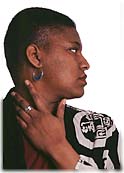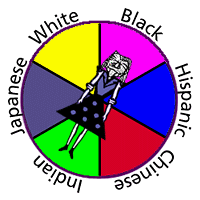
 | |
| Colorless? |
|
 Denise Jacobs Photo © 1998 K. Johanson |
 DENISE JACOBS | The child part of me is wide-eyed and wondering at the world
surrounding her. She is ignorant of social conventions, and sees differences in
people based on
whether a person is a kid or grown-up, if a person is kind to her, if someone
listens, and befriends her. DENISE JACOBS | The child part of me is wide-eyed and wondering at the world
surrounding her. She is ignorant of social conventions, and sees differences in
people based on
whether a person is a kid or grown-up, if a person is kind to her, if someone
listens, and befriends her.
I comfort and protect this child, to whom I must explain why someone would accuse her of shoplifting, or why someone would call her "Sir," or even how her family's history is the way it is. The child sees that her skin is brown, that it shimmers iridescent blue, red and gold in sunlight, and takes joy in the discovery. I look in the mirror and instead I see African-American, which has deeper implications. Often I long for the simplicity of brown, and I peer into the mirror, willing time to melt my perceptions to their origins. Instead the vestiges of history, the question of race, the ramifications of certain actions stare back at me. It infuriates me to have to interpret every situation in my life through the lenses of race, power and dominance. And it is frightening to find these elements in people I interact with. Language is particularly telling. In her essay "The Death of the Profane," Patricia Williams speaks of how the elimination of racial references neutralizes color, and therefore the issues that accompany race. Popular culture as a whole is sliding dangerously toward the "ideal" of being unbiased toward, and unconscious of, race. Williams argues that this practice does not only dismiss but negates a person's identity and the importance of her being. Four years ago I was in a relationship with a guy of Western European descent ("white"). I remember my concern that he "knew what he was getting into" — being in a relationship with a woman of African-American descent. This was prompted by my mother's inquiry: "Has he been out with a black girl before?" He said: "You know, when I think of you, I don't really think of you as being black. I just think of you as Denise." At the time I avoided exploring that, because having been in predominantly white situations most my life, I thought I understood the statement. It means: My being black is not a detriment; I am actually "like everyone else," I am "okay." "Like everyone else" translates to "like white people," and my identity as a woman of African descent is then bleached out, nullified. My personality, sense of humor, family history, all escape recognition and cease to exist. In another relationship, I came to see that the inherent problems were due not only to my partner's denial about racial/cultural differences, but mine as well. During those 18 months, the issue of race never came up. I never once broached how he felt about interracial situations, how he felt about people of color, how he saw himself in the world as an upper-middle-class white British male. I had always dismissed his treatment of me as an idiosyncrasy exclusive of our "racial" and cultural differences. I attributed it to time, proximity, age and experience, educational level, past personal histories. But rarely did I acknowledge that he was a white British male and that I am a black American woman. Looking back at his dance of approach and retreat, I see the issue of race must have played a more significant role than I was willing to admit. Are we all guilty of this transgression in some way? Internalized racism has prompted me to treat race as a non-issue in situations where it very much was one. Despite a shift of my preference in men from blonds to men of color not more than two or three years ago, I was not interested in black American men (black men from other countries were different because they were "exotic") and seemed to end up going out with Anglo men. I visualized myself having biracial children, or adopting international children of color, but not necessarily black, "because they are so cute." The list continues, and each item makes me wince — because, for all of the historical righteousness that I sometimes allow myself as a woman of color; for all of the articles about race/class/gender privilege that I once sent my white boyfriend in the Peace Corps in Africa; for all of the personal aesthetic choices I make that are against typical Anglo ones (such as having a short, "natural" afro as opposed to processed hair); after all of the minority student programs that I supported in college; I am aware of the ways I have adopted and may unwittingly perpetuate the systems that I profess to want to eradicate. I grow impatient and frustrated with white folk who claim they just don't know any better. I grow frustrated with myself, because I did, and do, know better. Protecting the child had its place, and I did a fine job of shielding her, casting a blind eye and a strong back to that which would hurt us both. But I now have the strength and courage to have this child grow up, and to let her to speak out. |